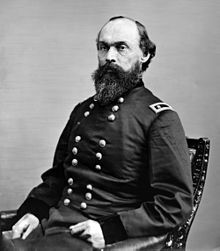Is this a word? Does it have anything to do with teenagers? Or the month of June? My 9-year-old wouldn’t stop badgering me with non-stop questions when I was reading about this latest holiday (June 19) that has been passed by US President Joe Biden just this week past. I take it you didn’t hear the news. I can believe it – it was the weekend of Father’s Day, and all the talk was about Fathers (and rightly so!).
Major General Gordon Granger
You might be wondering why a US national (they call it federal not national; we will discuss the various types of governments there are some other time) holiday should be of interest to us in faraway Ghana. Juneteenth has everything to do with the us in Ghana; matter of fact, it has tons to do with the whole continent of Africa. How so, do I hear you ask? Well, allow me to share my findings with you…

Juneteenth – what is it?
Juneteenth is the oldest commemoration of the ending of slavery in the United States. Dating back to 1865, it was on June 19th that the Union soldiers, led by Major General Gordon Granger, landed at Galveston, Texas with news that the enslaved (African Americans) were now free. This was two and a half years after then President Lincoln’s Emancipation Proclamation had become official on January 1, 1863.
The Emancipation Proclamation was not adhered to because of the relatively small number of Union troops (otherwise known as the US Army plus other allied forces) to enforce the new Executive Order. However, with the surrender of General Lee in April of 1865, and the arrival of General Granger’s regiment, the forces were finally strong enough to influence and overcome the resistance.
Later attempts to explain this two-and-a-half-year delay in receiving this important news have yielded several versions that have been handed down through the years. One of the often-told stories is that of a messenger who was murdered on his way to Texas with the news of freedom. Another is that, the news was deliberately withheld by the enslavers to maintain the African American workers on the plantations. And still another is that, federal troops actually waited for the slave owners to reap the benefits of one last cotton harvest before going to Texas to enforce the Emancipation Proclamation. Whether they are true or not remains unanswered.
Emancipation Proclamation
It reads as follows; “The people of Texas are informed that in accordance with a Proclamation from the Executive of the United States, all slaves are free. This involves an absolute equality of rights and rights of property between former masters and slaves, and the connection heretofore existing between them becomes that between employer and hired laborer.” (There’s a lot of old English in this text but the simple message was this – all slaves were free, and had equal right as their former slave ‘masters’)
The reactions to this profound news ranged from pure shock to immediate jubilation. While many African Americans were trying to understand this new freedom, others left before these offers were explained in detail – proving how much the realization of freedom hit the former slaves. Even with nowhere to go, many felt that leaving the plantation (i.e. large farms) would be their first grasp of freedom. The north (of the country, America) was a logical destination and for many (since they were coming from the south of the country) as it represented true freedom, while the desire to reach family members in neighboring states drove some into Louisiana, Arkansas and Oklahoma. Settling into these new areas as free men and women brought with it new realities and the challenges of now establishing a status for Black people in America.
Recounting the memories of that great day in June of 1865 and creating festivities around it would serve the ‘freed slaves’ as a release from the growing pressures encountered in their new territories. The celebration of June 19th was coined “Juneteenth” and grew with more participation from African Americans. The Juneteenth celebration was a time for reassuring each other, for praying and for gathering remaining family members. Juneteenth continued to be highly revered in Texas decades later, with many former slaves and descendants making an annual pilgrimage back to Galveston on this date.
The story of the slavery starts from the shores of West Africa and ends up in the US and other parts of the Western World – but it isn’t complete without acknowledging what happened to the slaves and how they (fought for) and got their freedom.










